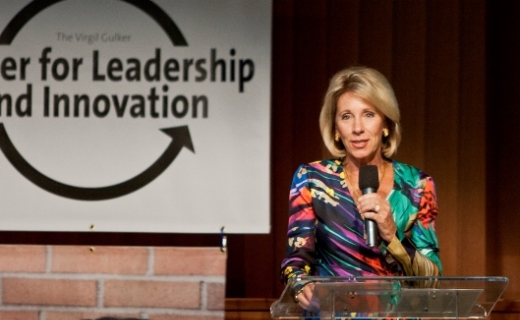President-elect Donald Trump’s likely win of Michigan where he is now some 13,000 votes ahead of Hillary Clinton has boosted the possibility that Betsy DeVos, a huge GOP donor, philanthropist and school choice advocate, will be picked for education secretary, according to Trump insiders.
DeVos, who was slow to endorse Trump, is considered “an outsider but an insider in the conservative movement,” said one source.
Should Trump eventually win Michigan, where final votes aren’t due until next week, DeVos, a former state GOP chair, and her husband, Dick, who was the 2006 GOP nominee for Michigan governor, will get some credit and her political advice will be key to the Trump team, especially heading into reelection in 2020.

In an interview with Philanthropy, Betsy DeVos explained her passion for school choice.
Dick DeVos is the son of Amway co-founder Richard DeVos and has a net worth of some $5 billion. Both he and his wife are well known philanthropists and major GOP donors.
Betsy DeVos is also a big mover in the school choice and charter school movement. She is chair of the influential school choice lobbying group American Federation for Children, backed by the Walmart family. The group backed 121 school choice candidates in the election, winning 89 percent.
And she is on an arm’s length list of boards and associations as well as being chairman of the Windquest Group, the Dick and Betsy DeVos Family Foundation, and the American Federation for Children,. She is also on the board of the DeVos Institute for Arts Management at the Kennedy Center.
Also reported to be in the mix for Trump’s education secretary is former D.C. schools chief Michelle Rhee, another school choice advocate.
DeVos grew up in Michigan and lives near Grand Rapids, a fact proponents of her nomination show her midwest roots.
In 2013, DeVos explained her roots and passion for charter schools and helping low income families get quality education for their children to Philanthropy Magazine. Part of that interview is below:
PHILANTHROPY: You’ve been a part of the movement since it was considered radical. What got you interested in the first place?
MRS. DEVOS: Well, it’s not like there was a single incident that drew me in. It was more gradual than that. When Dick and I had school-age children ourselves, we visited the Potter’s House Christian School, which for more than 30 years has been serving a part of Grand Rapids with many low-income families. While we were at the school, we met parents who were doing everything in their power to have their kids in an environment that was safe, where they were learning, and where the atmosphere was just electric with curiosity, with love for one another.
We kept going back. We would visit, and think about what we saw, and we’d want to visit again. We knew we had the resources to send our kids to whatever school was best for them. For these parents, however, paying tuition was a real sacrifice. We started supporting individual students at the school, and that grew into a larger commitment. To this day, we support the Potter’s House at a significant level.
PHILANTHROPY: And how did supporting that one school lead you to think more broadly about education?
MRS. DEVOS: Like I mentioned, at the time, we had children who were school-age themselves. Well, that touched home. Dick and I became increasingly committed to helping other parents—parents from low-income families in particular. If we could choose the right school for our kids, it only seemed fair that they could do the same for theirs.
Dick expressed his commitment by running for the State Board of Education in Michigan; he was elected in 1990. I got involved by starting a foundation that gave scholarships to low-income families so that parents could decide where their kids would go to school. We realized very quickly that, while it was wonderful to help some families through the scholarship fund, it was never going to fundamentally address the real problem. Most parents were not going to get the scholarship they wanted, and that meant most kids would not have the opportunities they deserved.
PHILANTHROPY: So that’s how you became more involved in the educational-choice movement?
MRS. DEVOS: Exactly. During the 1990s, I served on the boards of two national 501(c)(3) charities, Children First America and the American Education Reform Council, both of which worked to expand educational choice through vouchers and tax credits. Both Dick and I were politically involved in passing Michigan’s first charter-school bill in 1993. And in 2000, we tried—unsuccessfully—to change the state constitution to allow tax-credit scholarships or vouchers. It was really tragic, because Michigan has so many families, particularly in our state’s large, urban school districts, who are desperate for better educational options, and because our state constitution has some of the most restrictive language limiting educational choice in the country.
I’ve been in politics for some time, and I had been chair of the Michigan Republican Party for a few years. In response to the defeat of the proposed constitutional amendment I started a political action committee in Michigan called the Great Lakes Education Project, which was devoted to promoting education reform through the expansion of charter schools in the state. Over the course of two years—from 2001 through 2002—our work in Michigan was so successful that some of our friends in the movement began to say, “We really need to do this nationally.” And I said, “Yes, I think we do.”
Paul Bedard, the Washington Examiner’s “Washington Secrets” columnist, can be contacted at [email protected]
